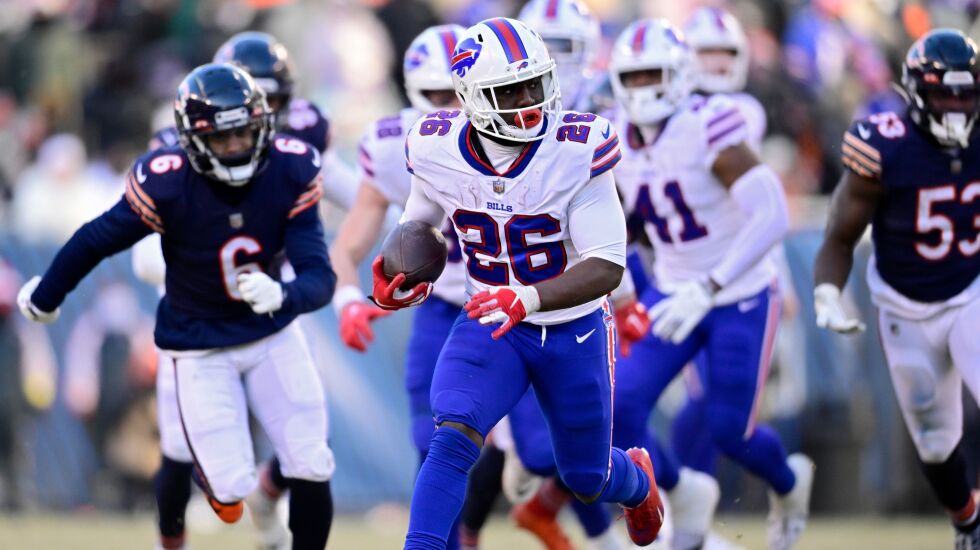
On a 33-yard touchdown run in the third quarter Saturday at Soldier Field, Bills running back Devin Singletary wasn’t touched until he got to the 1. On a 27-yard scoring run later in the quarter, running back James Cook wasn’t touched at all.
Good luck trying to parse which effort was worse.
The Bears gave up 8.2 yards per carry in a 35-13 loss to the Bills, a team that is typically far more dangerous when the ball is in quarterback Josh Allen’s hands than it is when he hands it off.
If it felt historically bad, it’s because it almost was. The 8.2 yards per carry were the ninth-most the Bears have given up in the 103-year history of the franchise.
It was actually much worse than that. With six minutes left — before the Bills were content to run the clock — the Bears had allowed 234 rushing yards on 23 carries. That abysmal average — 10.2 yards per carry — would have been the most any Bears team had given up.
With freezing temperatures and high winds daring teams to pass, Singletary (12 carries for 106 yards) and Cook (11 for 99) each ran for season highs.
‘‘It’s coaching and effort and responsibility by the player,’’ Bears coach Matt Eberflus said afterward.
All were lacking. On an already-depleted defense, that’s a recipe for disaster.
A team that traded linebacker Roquan Smith and defensive end Robert Quinn and lost safety Eddie Jackson to a foot injury played with as many backups as starters Saturday. Of the 14 Bears defenders who made tackles, only six were penciled in to start in Week 1.
The Bears lost linebacker Jack Sanborn, their leader in tackles since taking Smith’s place, for the season after he hurt his ankle last week. On Saturday, starting cornerbacks Jaylon Johnson and Kindle Vildor joined him on injured reserve.
The Bears were left to play three rookie cornerbacks in nickel defense: second-round draft pick Kyler Gordon and undrafted free agents Jaylon Jones and Josh Blackwell. Their pass defense held up surprisingly well, holding Allen to 172 passing yards and a 71.3 passer rating.
But the Bills were content to run.
On first-and-10 from the Bears’ 33 on the Bills’ first drive of the second half, Allen handed off to Singletary, who ran behind pulling right tackle Spencer Brown.
Caught blitzing Blackwell from the opposite direction of the run, the Bears were outnumbered. Brown blocked linebacker Nicholas Morrow while Singletary sprinted untouched toward safety Jaquan Brisker, who squared up to try to tackle him at the 23.
But Singletary shuffled his feet and broke left, and Brisker froze. When he turned to chase him, he slipped. Jones, deep in coverage, didn’t realize the Bills were running. When he did, he got blocked.
Neither Brisker nor Jones touched Singletary. The only Bears player who did was Blackwell at the 1, and Singletary fell into the end zone for a 33-yard touchdown.
‘‘Seeing a hole burst wide open, untouched,’’ Brisker said. ‘‘Tried to get him down. He made a good cut, and he scored. . . .
‘‘Everybody has a job to do on the defense. . . . Untouched? That’s the results. Somebody didn’t do their job.’’
Morrow said the Bills had a ‘‘good call’’ on against the Bears’ blitz.
‘‘Sometimes when you have pressures on and they pull, you’re a man short,’’ he said.
One fewer Bears player touched Cook later in the quarter.
With the ball at the Bears’ 27, Allen handed off to Cook, who ran between the right guard and right tackle. He bounced outside the right hashmarks and past linebacker Joe Thomas before cutting inside and causing safety DeAndre Houston-Carson to slip. He then followed receiver Stefon Diggs into the end zone.
‘‘They were more physical,’’ Brisker said. ‘‘Made a lot of great plays.’’
The Bears didn’t make enough.







